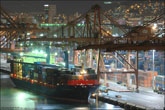Busan Port, which accounts for 80 percent of the country's container cargo, was virtually paralysed yesterday as a strike over skyrocketing fuel costs by the Korean Transport Workers' Union (KTWU) entered its fifth day, following the breakdown of talks with the government.
And there seems no respite as truckers are standing firm on their demands. "We will stay on strike until our demands are met," said a spokesman for the KTWU, after the union failed to come to an agreement with the government.
The government's proposal failed to meet our stated objective," he said.
The truckers are demanding that the government legislate for higher subsidies, a guaranteed minimum wage and recognition of truckers' full labour rights.
The country's economic woes worsened yesterday as some 17,000 unionised construction workers went on strike, also complaining about the high cost of fuel.
Container storage at the seven terminals of Busan Harbor's North Port has reached 86 percent, higher than the normal daily average of 72.1 percent.
At the Busan International Container Terminal Pier in Busan, which is used by Hanjin and Sebang shipping companies, storage reached 101.8 percent while at the new and old Gamman container terminals at Busan Harbour it reached saturation point with 99.7 percent and 97.2 percent respectively.
The volume of containers handled currently at major ports and inland container docks across the country has dropped drastically to 14,969 TEUs, a mere 22 percent of the normal daily average of 67,871 TEUs.
The freight loading ratio of cement cargo shipped from Danyang and Jecheon, North Chungcheong Province fell to less than 10 percent of the normal daily average.
A total of 13,369 truckers went on strike on Friday, with KTWU members hurling iron ball bearings or bottles at non-union truckers to stop them from transporting cargo.
The truckers' strike has caused US$2.31 billion in losses to exporters and $2.43 billion in losses to importers.
CargonewsAsia













